
| What John McCain learned from his Democratic mentor | |||||||||||||||||||||||||||||||||||||||||||||||||||||||||
THE BIG IDEA: Glossed over in the torrent of tributes to John McCain since his death Saturday are the five years he spent as the Navy’s liaison to the Senate. His tour of duty as a uniformed officer on Capitol Hill in the late 1970s and early 1980s was nearly as long as his imprisonment at the Hanoi Hilton. The experience taught McCain valuable lessons and forged relationships that made him an effective lawmaker over 36 years.
He made fast friends with young senators like Joe Biden, Gary Hart and Bill Cohen. He ingratiated himself with John Tower by smuggling liquor into Middle Eastern countries where alcohol was banned during CODELs. He even met the woman who would become his second wife, Cindy, while shepherding a congressional delegation through Honolulu on the way to China.
Sen. Henry “Scoop” Jackson (D-Wash.) became a key mentor during this period, indelibly shaping McCain’s worldview and approach to governing. First elected to Congress in 1940, he was a bridge to an era very different from our own. John F. Kennedy considered picking him as his running mate in 1960 before settling on Lyndon Johnson to shore up support in the South. Jackson’s consolation prize was chairing the Democratic National Committee. Like McCain would decades later, Jackson twice sought the presidency – in 1972 and 1976. He was stridently anti-communist, but he was liberal on domestic issues: an environmentalist who championed labor unions and civil rights.
McCain, who died at 81, was in his early 40s when he was the Navy’s point man on the Hill. The two struck up a close bond during long flights to faraway places. Jackson died at 71 in 1983, the year McCain joined the House. He replaced Barry Goldwater and became a senator in his own right in 1987.
Even as he battled brain cancer, McCain still spoke fondly of Jackson as “the model of what an American statesman should be,” invoking him with reverence during impromptu hallway interviews and in speeches. He strived to emulate him as a globe-trotting avatar of American values, willing to take on his own party leaders and go toe-to-toe with presidents.
In “Worth the Fighting For,” McCain identified half a dozen people who inspired him to get into politics. He devoted a full chapter to Jackson. “Although many in his party and mine would fault him for being too stubborn in a world that required subtlety and cunning, he was a hero for our time,” McCain wrote in the 2002 book, which came out halfway through his Senate tenure. “Few presidents can claim to have served the Republic as ably, as faithfully as Scoop Jackson did.”
Jackson taught McCain the impact that a single senator, if he’s savvy and determined, can have on American foreign policy. He emphasized that the Founders intended Congress to be a coequal branch of the government to the executive – a lesson many lawmakers could stand to learn in this age of going along to get along.
McCain, who loved the “maverick” moniker, proved willing to take on party leaders on everything from earmarks to “enhanced interrogation techniques,” from campaign finance reform to cigarettes and from health care to immigration. He did it as chairman of the Armed Services Committee, the Commerce Committee and the Indian Affairs Committee.
The old bull also learned from the young captain, who regaled him with now-well-known tales from his time as a prisoner of war in Vietnam. McCain, the son and grandson of admirals, was not unaccustomed to such rarefied air. But he saw firsthand how Jackson gave hope to the downtrodden by championing human rights as a central aim of American foreign policy.
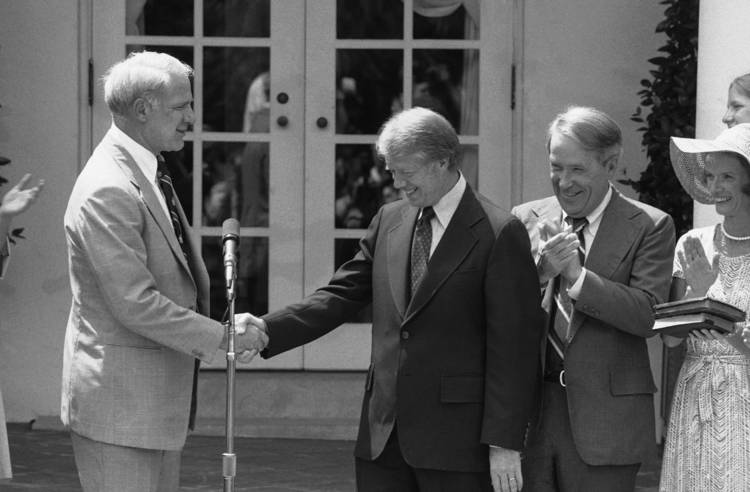
President Jimmy Carter shakes hands with Secretary of Energy James Schlesinger, left, after his 1977 swearing-in. Applauding in the Rose Garden is Sen. Henry M. Jackson (D-Wash.), who was then chairman of the Senate Energy and Natural Resources Committee. (Bob Daugherty/AP)
McCain described Jackson as “the Senate’s great apostle of freedom” in his final book, “The Restless Wave,” which came out in May. He said his mentor rejected the kind of false moral equivalency that was then popular in the Democratic Party but that has recently come into vogue in the GOP thanks to President Trump. McCain believed that the United States won the Cold War by supporting freedom, equal justice and the rule of law.
“We kept the faith, and we prevailed. No one of my acquaintance ever believed in that faith more sincerely, more ardently than Henry ‘Scoop’ Jackson,” McCain wrote. “He was a champion for the world’s oppressed and an enemy to those who gained power for themselves by disregarding the humanity of others.”
McCain praised Jackson for complicating the Richard Nixon and Henry Kissinger policy of detente with the Soviet Union by insisting that it not come at the expense of America’s commitment to human rights.“Over their objections, he passed legislation that conditioned trade with the Soviets and other autocratic regimes on the relaxion of emigration policies,” McCain wrote. “He was a hero to Soviet Jews wishing to immigrate to Israel.”
In the late 1970s, he escorted Jackson to Israel and could still recall how nearly a thousand refuseniks gathered to welcome them at the airport in Tel Aviv. “They mobbed us, slowing the bus’s progress to a crawl,” McCain recalled in his book. “Scoop and his beloved wife, Helen, were genuinely moved by the outpouring of affection. So was I, recognizing it, as Scoop surely did, as an outpouring of affection for America and our ideals. We don’t always appreciate as we should the value others place on the public statements of American officials. It matters what we say and what we don’t say. The U.S. remains the world’s leading power, and when our leaders speak, government and people take notice.”
He applauded Jackson for being “as much of an irritant to Jimmy Carter’s administration as he had been to Nixon and Gerald Ford.” “Scoop had his convictions, he believed in America’s mission, and when it came to acting on his beliefs, he didn’t particularly give a damn which party was in power,” McCain wrote. “America’s ideals came before party loyalty for him.”
When McCain joined Congress, he thought of Jackson’s example when he voted to override Ronald Reagan’s veto of sanctions on South Africa’s apartheid government. He also presciently opposed Reagan’s deployment of Marines to Beirut before the 1983 barracks bombing.
Like Jackson, McCain could also admit when he was wrong – as he did after the Keating Five scandal that nearly destroyed his political career. He later expressed regret for endorsing the Confederate flag ahead of the South Carolina primary in 2000 for political expediency and apologized for voting against creating a holiday to honor Martin Luther King Jr. He also admitted that the Iraq war “can’t be judged as anything other than a mistake” and accepted his “share of the blame for it.”
In his book this spring, McCain expressed regret that he did not pick Joe Lieberman, who could rightfully be described as the last Scoop Jackson Democrat to serve in the Senate, as his running mate when he was the Republican nominee in 2008. Instead, he tapped Sarah Palin – who lacked any meaningful foreign policy experience. McCain said Jackson taught him the importance of cross-party relationships.
McCain believed the Senate should live up to its goal of being the world’s greatest deliberative body, and he was sad to watch his cherished institution become more like the House, which has historically been both rowdier and more reflexively partisan. In this year’s book, McCain recounted how a House member from Tennessee, whom he did not name, embarrassed an American delegation he was part of during a 2005 meeting with the prime minister of Kyrgyzstan in Bishkek: “Like an Army scout trying to communicate with an Indian chief in a 1950s Western, he spoke slowly and loudly, using his hands to illustrate his message. ‘I come from a state with biiiig mountains,’ he offered. … ‘Kyrgyzstan very beautiful. My state very beautiful.’ To which the prime minister responded nonchalantly and in very good English, ‘Yes, I know. I have a daughter at Vanderbilt.’”
Jackson was a strong believer that supporting human rights meant having uncomfortable conversations even with U.S. allies, and McCain took that to heart when he visited places like Kyrgyzstan. “Our interests will often necessitate dealing with some pretty bad actors, but we shouldn’t pay for the privilege by declining to criticize how they mistreat their people,” McCain wrote. “All these trips, all these speeches, op-eds, press statements, interviews, professing support for Ukrainians and Georgians and Estonians and Montenegrins, condemning [Vladimir] Putin, criticizing my own government. Did it change anything, improve anything? I hope so. But I know for certain it meant something to the people I meant to help because they’ve told me it has. It meant that there were Americans on their side, that we hear them, we acknowledge the justice of their cause, they aren’t forgotten. … It matters. Scoop Jackson taught me that.”
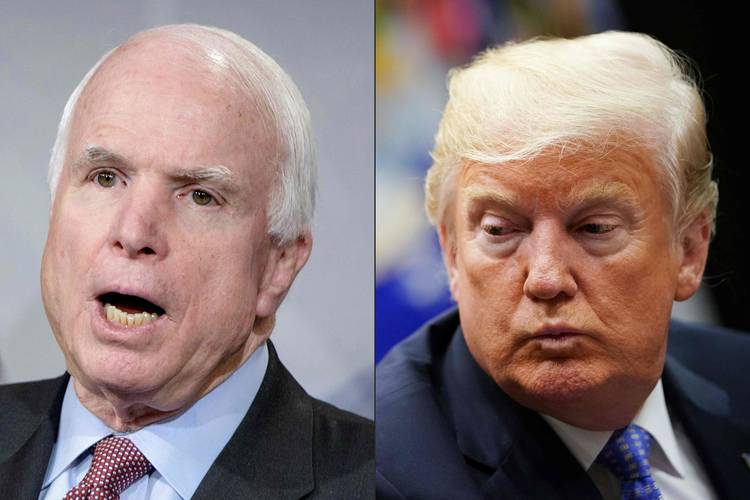
John McCain and Donald Trump. (Brendan Smialowski/Mandel Ngan/AFP/Getty Images)
TRUMP’S SNUB:
-- “President Trump nixed issuing a statement that praised the heroism and life of [McCain], telling senior aides he preferred to issue a tweet before posting one Saturday night that did not include any kind words for the late Arizona Republican,” Josh Dawsey reports. “Press secretary Sarah Huckabee Sanders, Chief of Staff John F. Kelly and other White House aides advocated for an official statement that gave the decorated Vietnam War POW plaudits for his military and Senate service and called him a ‘hero,’ according to current and former White House aides … The original statement was drafted before McCain died Saturday, and Sanders and others edited a final version this weekend that was ready for the president. …
“White House aides instead posted statements from officials other than the president praising McCain. By Sunday afternoon, the vice president, secretary of state, homeland security secretary, defense secretary, national security adviser, White House press secretary, counselor to the president, education secretary, interior secretary and others had posted statements … As tributes poured in, the president who said McCain was ‘not a war hero’ spent much of Sunday at his golf course in Virginia and did not utter a word publicly. In the afternoon, he returned to the White House, where the flags were lowered to half-staff in honor of McCain.
“McCain requested that Bush and Obama deliver eulogies at his funeral, while not inviting Trump. White House aides said it is unclear whether Trump will go to Capitol Hill, where McCain is to lie in state on Friday.
“Trump had repeatedly declined to say anything nice about McCain [even as he lay dying], leaving him out of a speech this month commemorating the signing of a defense-spending bill with the senator’s name on it.… Current and former White House aides said Trump continually said McCain was ‘not a friend’ and was out to undermine the administration’s agenda, quarreling with other aides who were more supportive. He continued to believe that McCain was not a war hero, officials said. …
“McCain’s popularity among Republicans has dropped as Trump has taken over the party. In a recent Fox News poll, 41 percent of Republicans said they had a favorable opinion of McCain, while 60 percent of Democrats shared the view. Trump’s approval is close to 90 percent among Republicans.
“Mark Hertling, a former senior military commander who lauded McCain on Twitter for visiting Mosul during heavy fighting in Iraq, said he was not surprised by Trump’s reaction to McCain’s death. Nineteen months into his presidency, Trump has yet to visit any war zones where American troops are fighting. ‘It was very shallow,’ Hertling said of Trump’s response.”
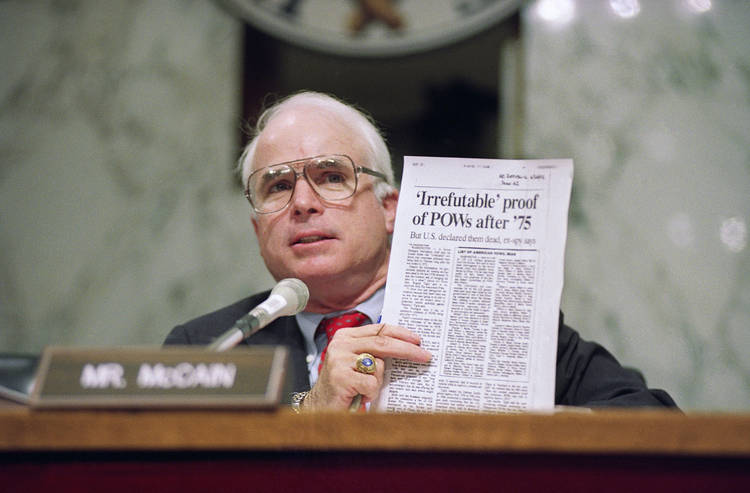
John McCain speaks during a hearing in 1992. (John Duricka/AP)
A LONG GOODBYE:
-- On Wednesday, McCain will lie in state at the Arizona State Capitol.
-- On Thursday, he will be honored at an Arizona memorial service at the North Phoenix Baptist Church at 10 p.m. Pacific. Then his casket will be flown from Goldwater Air National Guard Base to Joint Base Andrews.
-- On Friday, McCain will lie in state at the U.S. Capitol. A formal ceremony will take place in the Rotunda at 11 a.m. Eastern.
-- On Saturday, another memorial service will take place at Washington National Cathedral at 10 a.m. Eastern.
-- On Sunday afternoon, he will be buried after a private memorial service at the U.S. Naval Academy Chapel in Annapolis. He’ll be laid to rest next to his Naval Academy classmate Chuck Larson at a site overlooking the Severn River.
WHO WILL GET THE SEAT?
-- Arizona Gov. Doug Ducey will wait to announce a replacement for McCain until after his body is interred, a spokesman for the governor said Sunday. “State law requires Ducey to appoint someone from McCain’s party to fill the seat. The governor, a Republican who is running for reelection this year, has ruled out naming himself. But he has otherwise remained silent on the decision,” Tory Newmyer reports. “Arizona Republicans have mentioned a lengthy roster of potential successors — a list that includes McCain’s widow, Cindy; Ducey’s chief of staff, Kirk Adams; State Treasurer Eileen Klein; former congressman John Shadegg; and former U.S. senator Jon Kyl … McCain’s successor is likely to serve until the 2020 general election … Ducey favors appointing someone who could hold on to the seat, a Republican strategist familiar with the governor’s thinking (said) earlier this year.”
-- More Washington Post team coverage:
-- WaPo commentary:
WHILE YOU WERE SLEEPING:
-- A gunman opened fire at a gaming tournament in Jacksonville, Fla., killing two people and injuring 11 others before turning his weapon on himself. Antonia Noori Farzan, Kristine Phillips, Peter Hermann and Abha Bhattarai report: “The shooting occurred at the Madden NFL 19 competition at Jacksonville Landing, a popular waterfront shopping and dining area in the heart of downtown Jacksonville. … Jacksonville County Sheriff Mike Williams said officers found three people dead on the scene, including the gunman, who investigators believe to be David Katz, a 24-year-old man from Baltimore. At least 11 more victims were taken to local hospitals, nine with gunshot wounds and two who had been injured while fleeing the scene, Williams said. Williams said the gunman was attending the competition and took his own life, but added that he did not know the motive or if the suspect knew the victims.”
GET SMART FAST:

Rep. Martha McSally (R-Ariz.) speaks to reporters after a news conference at a campaign event in Phoenix. (Ross D. Franklin/AP)
THE MIDTERMS:
-- Arizona and Florida will both hold primaries tomorrow. And GOP Senate candidates in Arizona are not jumping to claim McCain's mantle. Avi Selk reports: “The Arizona Republican Party that nurtured McCain and his retiring Senate colleague Jeff Flake, whose seat those candidates are seeking, has been overrun by the party of Donald Trump. For Republican candidates now, the imperative is to embrace the president lest they lose his voters — and many of those voters share Trump’s antipathy to McCain. … Both [candidates Kelli Ward and Joe Arpaio] have also tried to link their opponent [front-runner Rep. Martha McSally] to McCain. … McSally — while not openly attacking McCain — has hardly spoken of him at all as her campaign has tilted further and further to the right. Once more publicly moderate and critical of Trump, she has fully embraced the president during her campaign.”
-- Rep. Ron DeSantis is expected to win Florida’s GOP gubernatorial primary, largely thanks to President Trump’s endorsement. The Miami Herald's David Smiley reports: “Though he has been outspent two-to-one by [Agriculture Commissioner Adam Putnam], DeSantis has steadily polled ahead dating back to the first debate between the two, held on Fox News in late June. Where Putnam has spent $35 million on things like campaign barbecues and television commercials, the conservative congressman has found a far cheaper way to reach voters through interviews on Fox defending Trump — and through Trump's own comments and actions. After tweeting [his] support of DeSantis, Trump seemingly locked up the Republican primary when he campaigned for the congressman in Tampa. But Trump's legal troubles this week … could give Putnam a pulse.”
-- On the Democratic side, Tallahassee Mayor Andrew Gillum hopes to win his party’s gubernatorial nomination and become Florida’s first black governor. David Smiley, Alex Daugherty and Martin Vassolo report for the Miami Herald: “[Gillum will] need the help of the state’s black community to get through Tuesday’s primary election. Significantly out-spent by his four opponents, Gillum’s ability to connect with a staunchly Democratic and somewhat disenfranchised voting population remains one of his biggest advantages. … Gillum, who is running for the Democratic nomination against Gwen Graham, Jeff Greene, Chris King and Philip Levine, has made clear that his campaign is not tailored exclusively to black voters. His message as ‘the only non-millionaire’ in the race is more appropriately described as a call to the lower and middle class.”
-- Democrats are privately skeptical about Sen. Bill Nelson’s odds of winning reelection, which could kill any chance of them retaking the Senate. From Politico’s Burgess Everett and Marc Caputo: “Nelson is a classic old-school senator who keeps his head down and does his work, which is effective in the Capitol but less so in a Trump-era campaign in the most expensive battleground state. He’s being vastly outspent, and there’s concern in Florida the national party might cut him loose if a loss looks certain in the expensive Sunshine State. And Florida Democrats fret that the low-key third-term senator has not been visible enough while [Gov. Rick] Scott is seemingly everywhere.”
-- Democrats in red states are effectively capitalizing on Trump’s trade war, using the president’s job-killing tariffs as a cudgel to wound their GOP challengers. Erica Werner reports: “Democratic candidates in Tennessee, North Dakota, Missouri and elsewhere have campaigned on their opposition to Trump’s trade efforts and warned of coming economic damage. Several have engaged in high-profile events with sympathetic figures hurt by Trump’s tariffs, accusing their rivals of being complicit in the president’s policy. The tariffs, and Democratic messaging concerning them, present GOP candidates with a complicated calculus: stand with Trump and support a policy that may threaten their constituents’ livelihoods or break ranks on trade with a president who is strongly backed by the party’s voters.”
-- At least eight Democratic physicians are running for Congress as first-time candidates this election cycle. Kaiser Health News’s Shefali Luthra reports: “Democrats see promise in such candidates given their very different experience. Of the 11 Democratic doctors running for office, all but one are seeking House seats. All but two are newcomers. Like many other Democrats, they are campaigning hard on the need to overhaul the nation’s health-care system. If they win, they would dramatically alter the current physician makeup in Congress. At the moment, 12 of the 14 doctors there are Republicans. … [Half of those Republican doctors] come from such high-paying fields as orthopedic surgery, urology and anesthesiology. By contrast, these stumping Democrats hail predominantly from specialties such as emergency medicine, pediatrics and internal medicine.”
THE NEW WORLD ORDER:
-- Punishing Russian businesses has become a “headache” at the Treasury Department — where sanctions have more power to sting U.S. customers and wreak havoc on Western countries. Jeanne Whalen and John Hudson report: “When the Treasury Department imposed tough sanctions on Russian oligarch Oleg Deripaska and his companies in April, the fallout for the Putin ally was fast and fierce. The sanctions also caused havoc far beyond Russia. Global aluminum prices spiked, battering U.S. and European companies that use the metal. … The episode is a cautionary tale as the United States readies more sanctions against Russia, including some beginning Monday that will affect U.S. technology exports, and some under consideration in Congress that could prove painful for European oil and gas companies. … One former Treasury official said the tumultuous rollout of the [sanctions on aluminum company Rusal] showed a lack of coordination with U.S. allies and ignorance about the global metals market.”
-- The United States and Mexico are making progress on resolving their differences on the North American Free Trade Agreement and could wrap bilateral talks as early as today, clearing the way for Canada to rejoin negotiations. Bloomberg News's Eric Martin and Jennifer Jacobs report: “Significant breakthroughs between Mexico and the U.S. came during the past several days on the contentious issues of automobiles and energy. … Talks continued Sunday at the [U.S. trade representative's] offices in Washington. Arriving at the meeting, Mexican Economy Minister Ildefonso Guajardo was upbeat.”
-- North Korea’s main newspaper accused the U.S. of plotting a military invasion against the country while pursuing dialogue “with a smile on its face.” The comments come after Trump halted Secretary of State Mike Pompeo’s planned trip this week to Pyongyang, citing a “lack of progress” in denuclearization. Simon Denyer reports: “Rodong Sinmun, the official mouthpiece of the Workers’ Party of Korea, cited alleged U.S. troop movements in the region, which it called ‘extremely provocative and dangerous’ and said they threatened to derail the dialogue. … South Korean President Moon Jae-in convened a meeting of his National Security Council on Sunday to discuss the cancellation of Pompeo’s trip. A spokesman said Moon’s planned trip to Pyongyang in September — his third summit with Kim [Jong Un] this year — now took on added significance.”
-- Defense Secretary Jim Mattis sent a memo to Trump in May imploring him to prioritize U.S. advancement of artificial technology to keep pace with China and other countries. The New York Times’s Cade Metz reports: “Mr. Mattis’s memo … reflected a growing sense of urgency among defense officials about artificial intelligence. The consultants and planners who try to forecast threats think A.I. could be the next technological game changer in warfare. … Nonetheless, the Pentagon appears to be pushing ahead on its own, looking for ways to strengthen its ties with A.I. researchers, particularly in Silicon Valley, where there is considerable wariness about working with the military and intelligence agencies.”
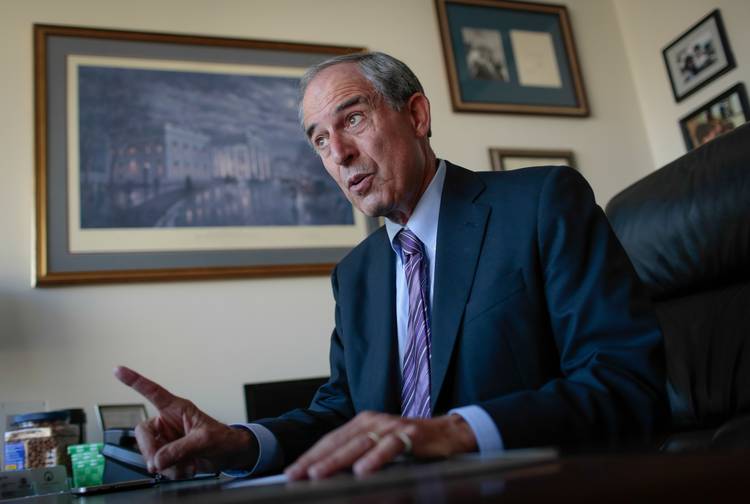
Lanny Davis in his office. (Dayna Smith for The Washington Post)
THERE'S A BEAR IN THE WOODS:
-- Michael Cohen's attorney Lanny Davis backed away from assertions that his client can “prove” Trump had advance knowledge of Russian efforts to undermine Hillary Clinton in the 2016 election. Tom Hamburger and Rosalind S. Helderman report: “[Davis] said in an interview this weekend that he is no longer certain about claims he made to reporters on background and on the record in recent weeks about what Cohen knows about Trump’s awareness of the Russian efforts. Davis did not rule out that his claims were correct but expressed regret that he did not explain that he could not independently corroborate them, saying that he now believes he ‘should have been more clear.’ "
-- Congressional Republicans have circulated a spreadsheet outlining the investigations they expect Democrats to launch if they retake the House and obtain subpoena power. The list includes topics such as Trump’s tax returns, his family businesses and the firing of FBI Director James Comey. Axios’s Jonathan Swan reports: “The spreadsheet — which I'm told originated in a senior House Republican office — catalogs more than 100 formal requests from House Democrats this Congress, spanning nearly every committee. The spreadsheet includes requests for administration officials to be grilled by committee staff, requests for hearings to obtain sworn testimony, efforts to seize communications about controversial policies and personnel decisions, and subpoena threats. These demands would turn the Trump White House into a 24/7 legal defense operation. … Lawyers close to the White House tell me the Trump administration is nowhere near prepared for the investigatory onslaught that awaits them, and they consider it among the greatest threats to his presidency.”
-- Retired Harvard Law professor Alan Dershowitz said Trump should be more concerned about the actions of federal prosecutors in New York than Robert Mueller's probe. “I think he has constitutional defenses to the investigation being conducted by Mueller,” Dershowitz said on ABC's “This Week.” “But there are no constitutional defenses to what the Southern District [of New York] is investigating. So, I think the Southern District is the greatest threat.” Dershowitz, who also serves as an informal Trump adviser, later offered four points of advice to Trump in dealing with special counsel prosecutors. “Don’t fire, don’t pardon, don’t tweet and don’t testify,” he said. "[If] he listened to those four things, he’d be in less trouble than he is today.” (Felicia Sonmez)
-- Sen. Jeff Flake (R-Ariz.) warned Trump against firing Attorney General Jeff Sessions, saying that doing so “would be the first domino to fall” in dismantling the Russia investigation. “Then what happens with Rod Rosenstein?” Flake asked on NBC's "Meet the Press." “What happens with [Mueller]? … There may be a few isolated voices saying that the president ought to fire him now. I can tell you as a body we’re saying, ‘Please don’t.’ " Some Republicans, such as Sen. Lindsey Graham (R-S.C.), are signaling that they're okay with Trump firing Sessions now, but they want him to hold off until after the midterm elections. Flake will leave Congress at the end of the year. (Politico)
-- The president’s approval rating stayed steady following a plea deal by Cohen and the conviction on eight counts of former Trump campaign chairman Paul Manafort, according to NBC-Wall Street Journal polling. NBC News’s Carrie Dann and Mark Murray report: “Between Aug. 18 and Aug. 22 — the day after the news involving [Manafort] and [Cohen] — the president's approval rating stood at 46 percent approve, 51 percent disapprove. In a separate NBC/WSJ survey, conducted Aug. 22 through Aug. 25, Trump's approval rating was 44 percent approve and 52 percent disapprove. That's within the poll's margin of error.” But, but, but: “The stability in Trump's approval rating also comes as more than half of voters say he has not been honest and truthful regarding the [Mueller investigation]. And fewer than three-in-ten voters are convinced that Trump himself is not implicated in the wrongdoing of the six of his associates who have now either been convicted of crimes or have pleaded guilty.”
-- Trump uses his recurring mantra of “no collusion” to “minimize and trivialize” the Russia probe, the New York Times’s Julie Hirschfeld Davis explains: “It is the answer to every question, the nonresponsive parry to every thrust of a question about the president’s credibility and actions, the ultimate rejoinder to any hint of wrongdoing by Mr. Trump. … There is a strategy behind Mr. Trump’s framing. … It’s a way of mocking what is in fact a serious allegation, of muddying the waters of what is a clear-cut question that Mr. Mueller is working to answer. … If the issues looming over his presidency are a kind of game, then perhaps voters will consider themselves nothing more than popcorn-munching spectators in a drama, rather than people deeply invested in the outcome. That could be vital to Republicans’ chances of keeping Congress.”
-- The decline in financial regulation and fraud investigations made it easier for Cohen and Manafort to get away with their actions. Damian Paletta, Robert O'Harrow Jr. and Michelle Ye Hee Lee explained in Sunday's paper: “The felonies slipped past multiple agencies and were unearthed by prosecutors and journalists only after they began digging into Trump’s inner circle. White-collar crime experts believe similar behavior is flourishing throughout the political system, exploiting the yawning gaps in government scrutiny. … Such worries come amid a steady, multiyear decline in the number of financial fraud cases the government has pursued, erosions that began during the Obama administration after Republicans took control of Congress. The IRS, for instance, conducted audits on just 0.6 percent of tax returns last year, the lowest level in 15 years.”
-- The case of a Columbia professor’s 1956 disappearance could have major implications on Mueller’s ability to publicly release information about his investigation. From Politico’s Josh Gerstein: “The substance of the case is entirely unrelated to Mueller’s investigation. … But if a Washington appeals court set to hear the murder-related case next month sides with the Justice Department and rules that judges don’t have the freedom to release grand jury information that is usually kept secret, it could throw a monkey wrench into any plans Mueller has to issue a public report on his probe’s findings, lawyers following the issue said. And it might even keep the special counsel from sending a report to Congress, shaking Democrats’ hopes that such a document could provide the impetus for impeachment proceedings against the president.”
SOCIAL MEDIA SPEED READ:
The Internet was dominated by tributes to McCain this weekend. The senator's family grieved:
McCain's hometown paper recognized his legacy:
McCain's MLB team held a moment of silence for him:
Former presidents marked the end of an era:
One of McCain's close friends reflected on his loss:
The House speaker said McCain had earned the honor of lying in state at the Capitol:
From a Democratic senator:
From a former Democratic attorney general:
From a former CIA director:
From the former commander of U.S. Army Europe:
Russia did not mourn McCain's death, per a Weekly Standard reporter:
From a Politico editor:
A Never Trump Republican operative slammed the White House over its handling of McCain's death:
A Weekly Standard editor re-shared a story from the 2000 presidential campaign about McCain:
One CNN host was blamed for McCain's 2008 loss:
Pretty much everyone at the Capitol has a McCain story. From a senior aide to Mitch McConnell:
A former GOP Senate counsel remembered a time when McCain showed him “respect”:
A Washington Post columnist recalled this memory:
A Post reporter replied with another story:
One GOP strategist imagined McCain making friends in the afterlife:
Meanwhile, Trump highlighted his polling numbers:
Senate Democrats continue to seek a delay in Brett Kavanaugh's confirmation hearings:
Hillary Clinton waded into the fight against Kavanaugh:
A House Democrat used Women's Equality Day to call for blocking Kavanaugh's nomination:
A Post columnist shared a letter from a reader:
A BuzzFeed News L.A. bureau chief criticized the Florida governor after another mass shooting:
A Politico reporter compiled a list of Florida shootings:
And the Onion mocked the Trumps' potential legal troubles:
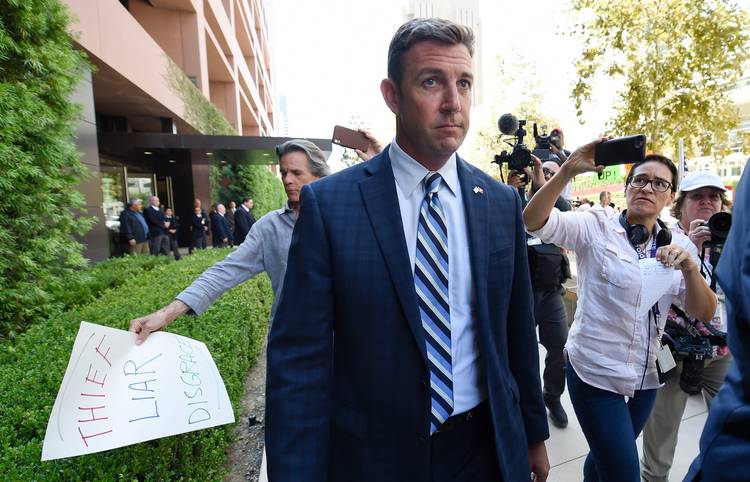
Rep. Duncan D. Hunter (R-Calif.) leaves an arraignment hearing in San Diego. (Denis Poroy/AP)
GOOD READS FROM ELSEWHERE:
-- New York Times, “Hard Partying and a Corruption Scandal: Duncan Hunter’s Political Life Unravels,” by Tim Arango, Adam Nagourney and Jose A. Del Real: “In Alpine, Calif., a suburban Southern California enclave, Duncan Hunter was a good neighbor. He’d help people do yard work, or move heavy furniture. He drove the same dented-up truck for years. At parties, he’d have a beer, two tops, and he might go off and sneak a cigarette so his wife wouldn’t see. He rarely talked about his job as a congressman. In Washington, Mr. Hunter was a fixture on the bar scene, and spent lavishly — over $400 for 30 tequila shots at a bachelor party, and countless fancy dinners. He visited one of his favorite bars sometimes multiple times a day, piling up thousands of dollars in tabs. On occasion, he would get into loud arguments with patrons, once over the choice of music on the jukebox (he hated Celine Dion).
“Those divergent lives — between the watering holes and halls of power in Washington and the suburban tracts and chain stores of Southern California — intersected for years, prosecutors say, as Mr. Hunter and his wife funded their personal lives with campaign donations, the dimensions of which were revealed in an indictment last week. … The indictment, interviews with those who know him and his own personal statements show how a seemingly ideal political life unraveled under personal financial pressure, opening the door to a web of corruption and deception that lasted several years as Mr. Hunter lived a seemingly dual life.”
-- New York Times, “High Profits and Misery Meet at Door of Smugglers’ Stash Houses,” by Ron Nixon: “Smugglers are making millions of dollars by extorting migrants after sneaking them into the United States and shuttling them from house to house.”
-- New Yorker, “Glenn Greenwald, the Bane of Their Resistance,” by Ian Parker: “Greenwald, a former lawyer who, in 2013, was one of the reporters for a Pulitzer Prize-winning series in the Guardian on Edward Snowden’s disclosures about the National Security Agency, is a longtime critic, from the left, of centrist and liberal policymakers and pundits. During the past two years, he has further exiled himself from the mainstream American left by responding with skepticism and disdain to reports of Russian government interference in the 2016 Presidential election. … These arguments, underpinned by a distaste for banal political opinions and a profound distrust of American institutions—including the C.I.A., the F.B.I., and Rachel Maddow—have put an end to his appearances on MSNBC, where he considers himself now banned, but they have given him a place on Tucker Carlson’s show.”
DAYBOOK:
Trump will have lunch with Pence and then meet with Kenyan President Uhuru Kenyatta. He and the first lady will also host a dinner tonight for evangelical leadership.
NEWS YOU CAN USE IF YOU LIVE IN D.C.:
-- Washingtonians should expect hot and humid weather through Thursday. The Capital Weather Gang forecasts: “The air is thick with humidity as the sun beats down on us. So, yes, it’s a hot one. Highs reach near 90 in our cooler spots and low 90s elsewhere. But with the humidity, it feels like 95 to 100 in the mid- to late afternoon. The light breeze from the west does little to cool us off.”
-- The Nationals beat the Mets 15-0. (Jorge Castillo)
-- Immigrant advocates are criticizing the District for not spending government funds on legal aid to immigrants who have been detained by ICE and are facing deportation. From Fenit Nirappil and Marissa J. Lang: “Some advocates say those cases need the most help, and D.C. Council members set aside $400,000 in this year’s budget to do just that. But [Mayor Muriel E. Bowser's] administration redirected that money into its grants program for immigrant legal services, which drew 23 applications for $900,000 in grants to be awarded next month. Aides to Bowser say the program was already on precarious ground because of attention from Republicans in Congress, which has veto power over the District’s laws and spending. By not funding the legal defense of detained immigrants, the city eliminated the most contentious issue, they said.”
VIDEOS OF THE DAY:
Hawaii residents recalled the flooding caused by Hurricane Lane:
And a black bear wandered into the lobby of a Colorado hotel:
|








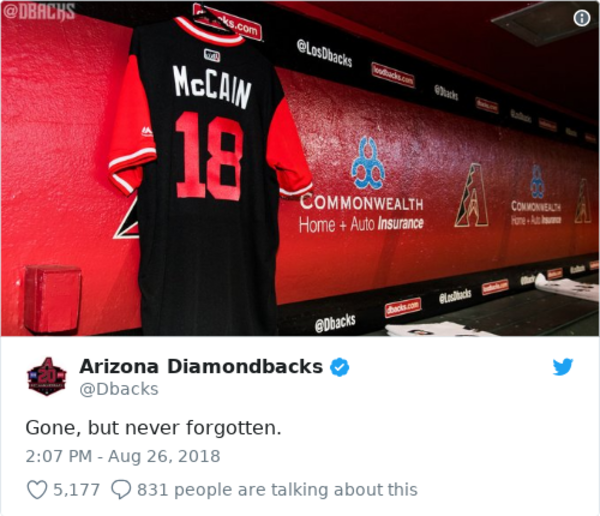
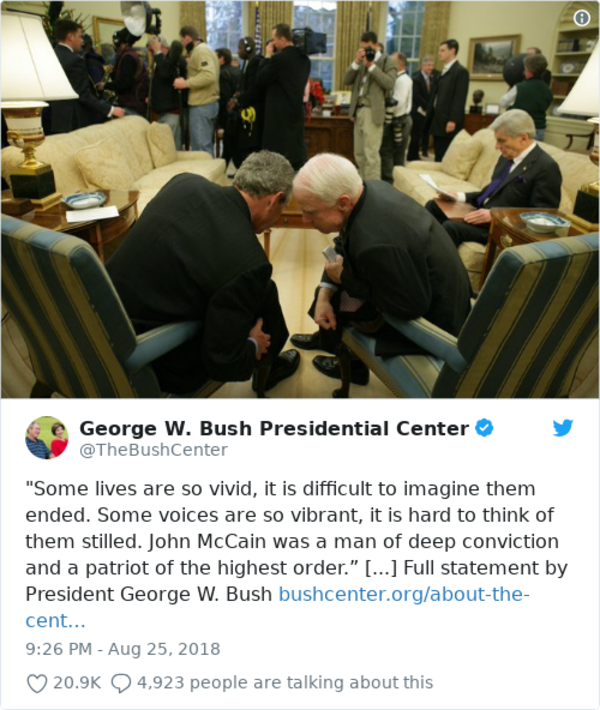












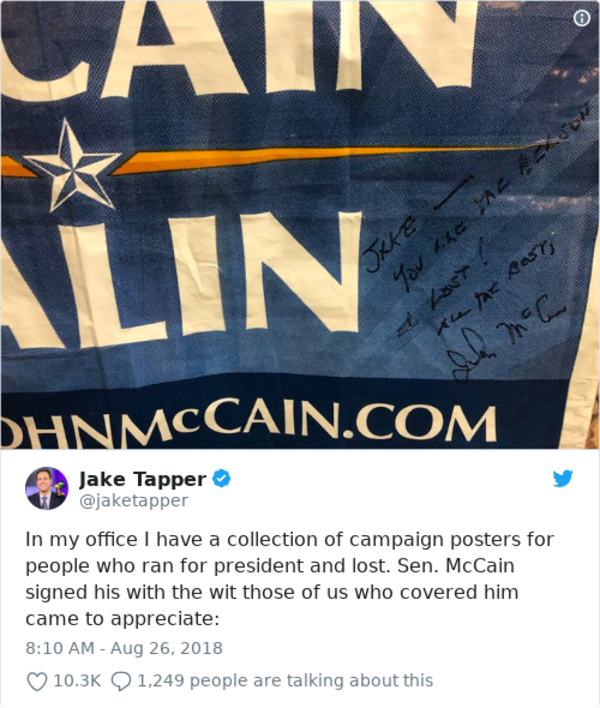




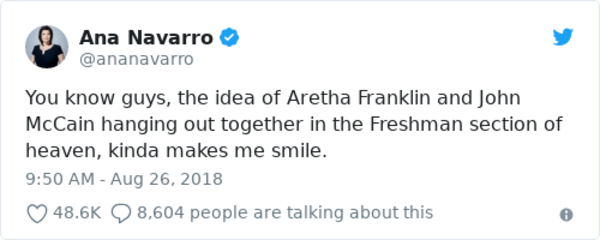


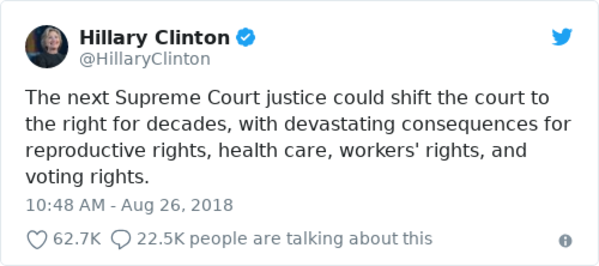








Comments
Post a Comment